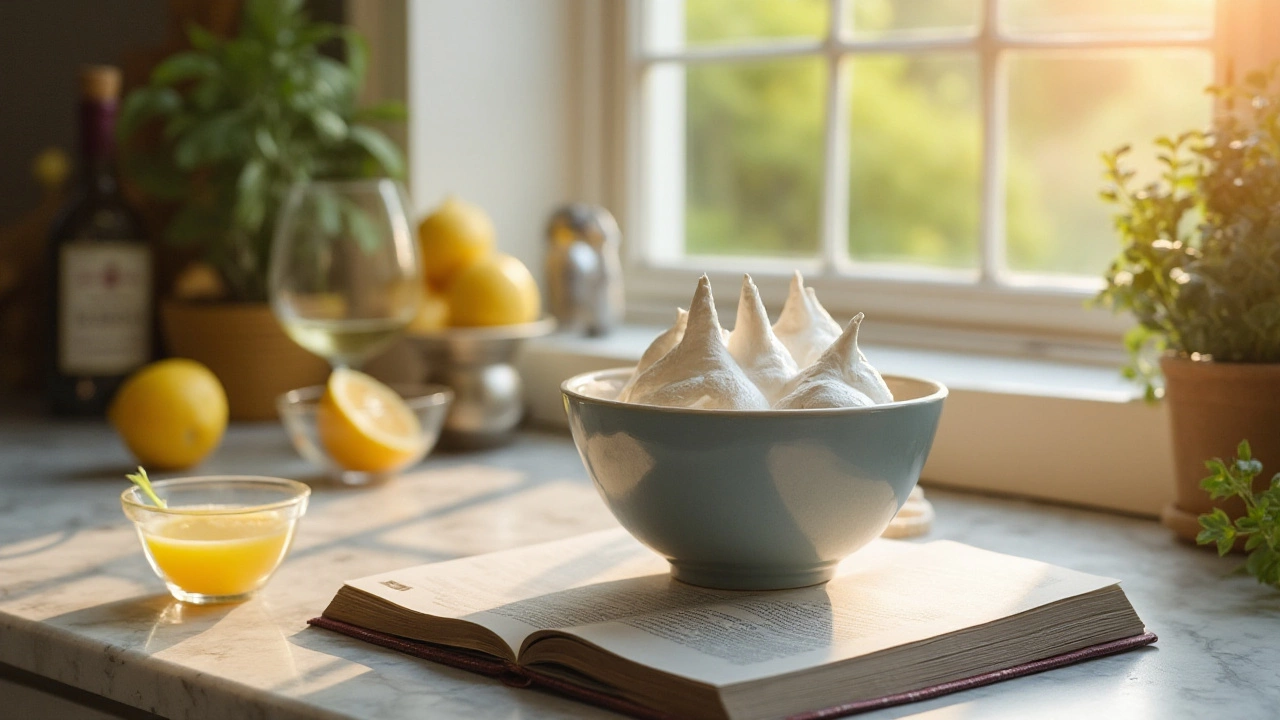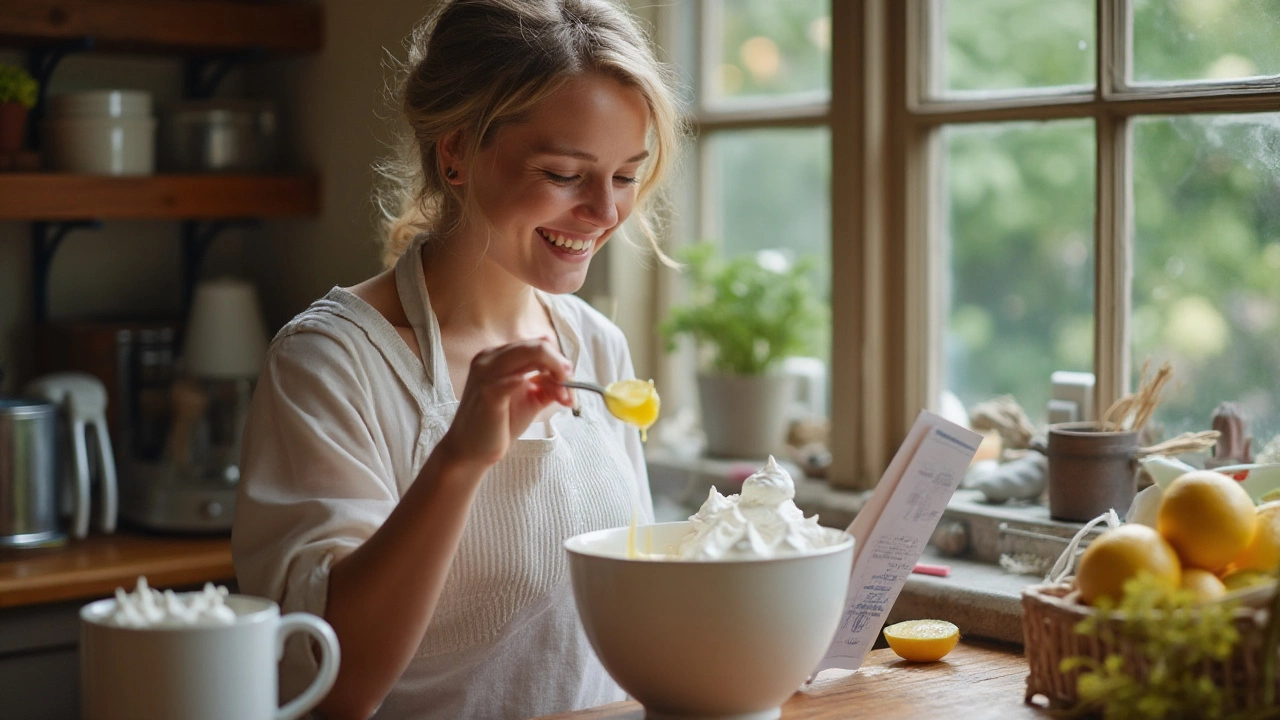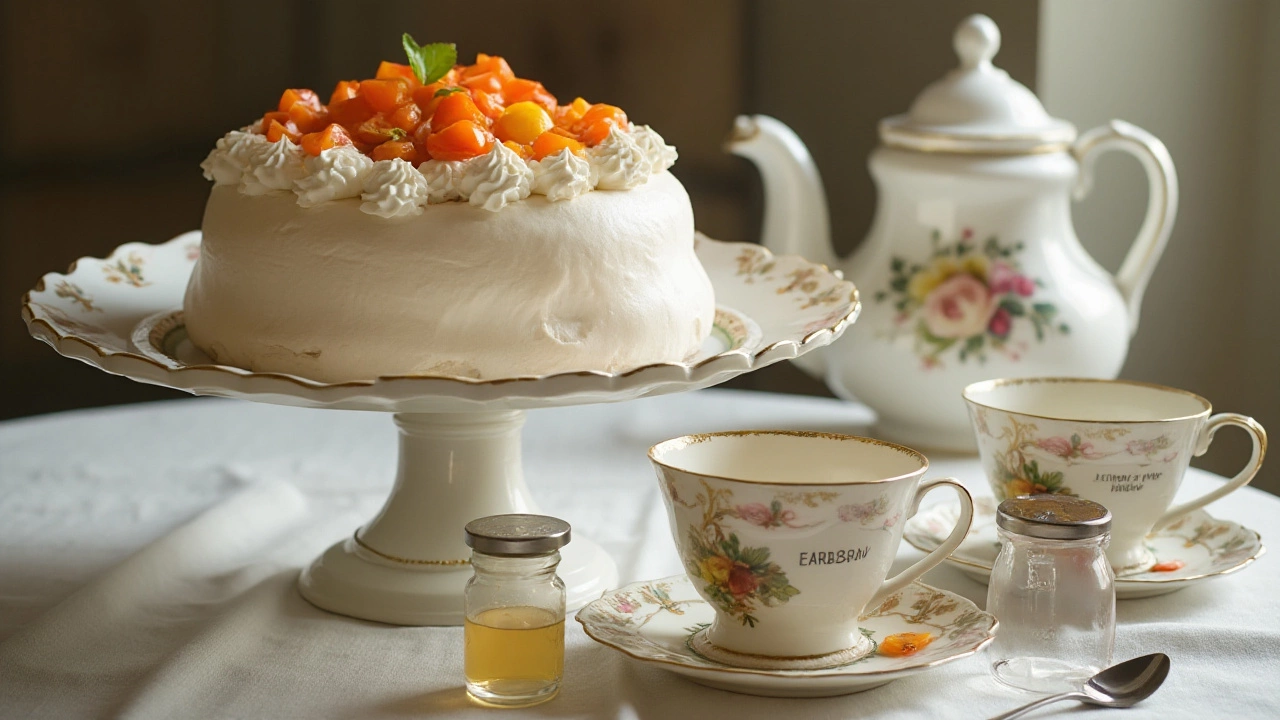
In the world of pavlovas, every ingredient has its role to play, none more crucial than the acid. It ensures your meringue stands tall with that divine, crisp exterior and soft interior. The debate between using lemon juice or sticking to the traditional white wine vinegar can have a significant impact on your dessert.
Acidity not only stabilizes the foam structure of the egg whites but also influences the flavor profile subtly yet distinctly. Home bakers often wonder about swapping one for the other, either out of necessity or curiosity. As you sift through various meringue recipes, understanding how these acids interact differently is key to reaching the desired texture.
Whether you're short on vinegar or just feeling adventurous, let's delve into the science and art behind this substitution. How will your pavlova's flavor shift? What about its texture? Should you adjust quantities? These questions are what we'll explore, demystifying the seemingly simple yet deceptively intricate choice between lemon and vinegar.
- The Role of Acid in Meringues
- Comparing Lemon Juice and White Wine Vinegar
- Flavor Impact
- Structural Changes
- Tips for Substitution
- Final Thoughts
The Role of Acid in Meringues
Creating the perfect pavlova involves a delicate balance of ingredients, and among these, the role of acid is something that cannot be ignored. Acidity, usually provided by either lemon juice or white wine vinegar, is indispensable in achieving that ideal structure and texture so characteristic of a delightful meringue. When you whip up egg whites, you're essentially forming a protein foam, and acids are essential in stabilizing this foam. The acid works to lower the pH of the egg white's proteins, causing them to denature and rearrange in a way that lets them trap air more effectively. Thus, the added acid gives your pavlova a sturdy backbone, enabling it to hold up beautifully during baking and retain its form once cooled.
The science behind this is fascinating, as the acid's molecular interaction with the egg whites can be considered a miniaturized chemical ballet. Both lemon juice and white wine vinegar are acidic, but they differ in their strength and the flavor they impart. It’s this balance that chefs and bakers gauge carefully, since even a slight excess or deficiency in acid can mean the difference between a standing pavlova or one that collapses pitifully. The inclusion of acidity also combats the effects of over-whipping, which is a common mishap in home kitchens. Overbeaten egg whites can become grainy and lose their silky texture, but the preferential proteins enhanced by the acid help re-align the foam correctly, achieving that coveted glossy peak.
"Acid is the unsung hero in the kitchen laboratory, altering not just flavors but the very texture of our creations," says renowned pastry chef Claire Ptak.It's intriguing how a squeeze of lemon or a dash of vinegar can hold the power to dictate the outcome of this dessert. Given that pavlovas are as much about visual appeal as they are about taste, achieving that pristine, cloud-like texture is an art. Acid acts as both a guide and a guard in this context, ensuring that even during a long bake, moisture is retained to some extent, preserving the marshmallowy interior. When this role is grasped and applied, your meringue is as resilient as it is exquisite, making every bite a heavenly experience.
Comparing Lemon Juice and White Wine Vinegar
When it comes to crafting the perfect pavlova recipe, the choice between using lemon juice or white wine vinegar can be as significant as the quality of the eggs themselves. While both serve the primary purpose of adding acidity to the meringue, they come with their own nuances, which can significantly affect both the flavor and texture of the dessert. Lemon juice, with its vibrant and tangy profile, often adds a refreshing citrus note that can elevate the lightness of a pavlova. This natural juice contains citric acid and has a unique aromatic quality that complements light, fruity toppings beautifully, creating a harmonious balance.
On the other hand, white wine vinegar provides a subtler, less intrusive acidic element. Its role is to stabilize the egg whites and help to create a crisp shell, all while allowing the other flavors in the recipe to shine. It is less about flavor and more about functionality, which is ideal for purists aiming for a classic pavlova experience. The vinegar’s acetic acid content assists in avoiding overwhipping, often leading to the pavlova's trademark marshmallow-like interior.
Some bakers prefer the tried and tested white wine vinegar, appreciating how it does not conflict with the sweetness of the meringue. However, lemon’s popularity is on the rise, largely due to its natural sources and health benefits. It’s worth noting that lemon juice comes in varied concentrations, so the quality and type of lemon can sometimes lead to inconsistent results. Shirley Corriher, a celebrated biochemist and cookbook author, once said,
"The acid unwinds proteins in egg whites, making them more stable and less likely to collapse while whipping."This insight underscores the scientific basis that both lemon juice and vinegar fulfill in stabilizing egg white foams.
In determining which to use, consider the flavor profile and final presentation you aim to achieve. If tart, zesty notes complement your vision, fresh lemon juice can be an excellent choice. Should you wish to maintain a traditional, understated sweetness, then white wine vinegar is your best bet. Easily accessible and versatile, each can be interchanged in meringue recipes. It boils down to personal preference and the specific flavors you want to accentuate. Keep in mind, a tablespoon of either will usually suffice, but slight adjustments could be necessary depending on your ingredients' characteristics.

Flavor Impact
When it comes to crafting the perfect pavlova, the choice between lemon juice and white wine vinegar isn't just about availability; it shapes the dessert's taste. Lemon juice introduces a crisp, citrusy zing that can brighten the palate, offering a fresh contrast against the sweet meringue. This can be especially appealing in summer pavlovas adorned with an array of fresh berries, where the bright tang of lemon enhances the fruitiness.
On the other hand, white wine vinegar provides a subtler, nuanced acidity, allowing the sweetness of the meringue and the flavors of the toppings to shine without interference. Its mild nature makes it a favorite in more traditional pavlova recipes, where a balance of flavors is key. Amid a complex dance of sweetness, fruitiness, and creaminess, vinegar's understated tartness can help maintain harmony.
It's worth considering that some professional chefs have spoken about their preferences when it comes to acidity in desserts. Nigella Lawson, for example, has mentioned in her culinary discussions how subtle hints of vinegar are often best in classic desserts, maintaining a delicate balance of flavors without overpowering.
"The essence of a great pavlova lies in its simplicity; too strong an acidic note can overshadow the elegance of this dessert," she notes in one of her columns.
If you're planning on using strongly aromatic fruits or a flavorful compote as a topping, reaching for lemon juice could accentuate these flavors further. However, the rich complexity in dishes where tone is as important as taste, vinegar might be your ally. Some bakers choose their acidic component based on the occasion or the specific elements of the pavlova they wish to highlight.
Ultimately, both ingredients bring something unique to the table, and experimenting with either can lead to delightful discoveries. Whether you opt for lemon juice’s vibrant burst of flavor or vinegar’s classy understatement, remember that the primary goal is to create a dessert that leaves a lasting impression and satisfies the soul.
| Ingredient | Flavor Intensity | Best Pairings |
|---|---|---|
| Lemon Juice | High | Fruity toppings, berries |
| White Wine Vinegar | Mild | Traditional toppings, mixed fruits |
Structural Changes
When crafting the perfect pavlova recipe, understanding the structural nuances brought by different acidic agents can greatly influence the final outcome. First and foremost, acids such as lemon juice and white wine vinegar play a crucial role in stabilizing egg whites. This stabilization process helps create an elegant, airy structure that is fundamental to a successful meringue. As the egg whites are beaten, the acid aids in unfolding the proteins in the whites, which then link together to form a stable network that traps air, offering that quintessential pavlova softness inside and a crisp exterior.
Switching from white wine vinegar to lemon juice isn’t just a simple swap. The two vary significantly not only in their pH levels but also in their organic compound structures, both of which can affect the meringue's structure. Lemon juice, being slightly more acidic, can lead to a stiffer and more resilient meringue given its ability to catalyze the protein denaturation process more effectively. This might sound overly technical but think of it as the difference between a tightly woven fabric and one that is more relaxed and airy.
What Happens When You Substitute?
When substituting, it's essential to note quantity adjustments. Lemon juice has a more pronounced taste, and using it in the same measure as vinegar can alter the fine-tuned balance of flavors. Additionally, its increased acidity can accelerate the foam stabilization rate during whipping, potentially resulting in a drier meringue. This tiptoe balance of acid and sugar, alongside careful whipping, is the secret to a structural masterpiece in meringue creation.
In practical home settings, using lemon juice may sometimes lead to a hollower outcome if not properly balanced with the right amount of sugar. As Harold McGee noted in his culinary science book,
"The trick in working with acidic substitutions lies in attentive balancing, ensuring the acid harmonizes without overpowering the natural sweetness of the meringue."This can mean altering the baking time or introducing incremental sugar alterations to achieve that perfect crunch without sacrificing the lightness.
| Comparative Aspect | White Wine Vinegar | Lemon Juice |
|---|---|---|
| Acidity Level | Moderate | Higher |
| Flavor Impact | Mild | Citrusy |
| Structural Effect | Balanced Crispness | Additional Stiffness |
Ultimately, the choice between lemon juice and white wine vinegar comes down to the baker's intended outcome and personal palate preference. It's about understanding how each component affects the structure, delicately balancing the scientific with the artistic. The world of pavlovas is one of nuanced decisions that, when mastered, yield delicious rewards worth savoring.

Tips for Substitution
When contemplating replacing white wine vinegar with lemon juice in pavlova recipes, it’s important to first understand the chemical purpose each ingredient serves. Both ingredients are acidic, which is crucial for stabilizing the egg whites by lowering their pH. This, in turn, helps the proteins in the egg whites form a firm and stable meringue, which is key to a pavlova’s airy texture.
The ratio of acid used is vital. Typically, for each batch of four egg whites, use about one teaspoon of white wine vinegar. If you swap to lemon juice, maintain the same amount but be aware of its potential impact on flavor. Lemon juice imparts a zesty, citrus note, which can enhance a pavlova, pairing beautifully with fruits such as berries. If the recipe hinges on its classic flavor, this note can be a plus or a distraction.
Flavor and Aroma
While swapping vinegar with lemon juice seems straightforward, the additional vibrant lemony undertones may not be suitable for all. If your pavlova features bold toppings like chocolate or coffee, lemon can become an unexpected and perhaps unwelcome flavor. To mitigate this, consider using vanilla essence or almond extract to balance the citrusy edge brought by the lemon.Consistency is another consideration when choosing between lemon juice and white wine vinegar. Lemon juice is slightly less acidic than vinegar, so while it aids in stabilizing, it might not provide the same level of crispness. This subtle textural change means if your heart is set on a perfect, crunchy exterior, a slight increase in baking time may be required while monitoring closely to avoid burning. Meringue can be a finicky thing and even slight alterations can produce varied outcomes.
Chef Nigella Lawson mentions, "A good cook knows it's not just about ingredients, but the balance between them. Pay attention to the way they dance together, even in something as simple as a meringue." This highlights the importance of precision when experimenting with substitutions.
Perfecting the Balancing Act
To make this substitution a full success, consider your audience’s palates and the context in which the pavlova will be served. If acidity levels are a prime concern, for those with a delicate palate or an aversion to sourness, gentler variations can involve a combination of both vinegar and lemon in reduced quantities. Keep a small test batch ready, taste, and tweak as necessary.Ultimately, armed with these tailoring tips, your pavlova will stand to impress, offering a refreshing twist on tradition. Adjusting for lemon juice in place of white wine vinegar can make all the difference between creative innovation and timeless classic, turning a mere dilemma into a delightful culinary journey.
Final Thoughts
As we wrap up our exploration into the realms of alternative acid choices for your pavlova, it's apparent that the decision to use lemon juice instead of white wine vinegar is more than just a matter of convenience or necessity. The outcome touches on the very essence of meringue-making: creating a delicate balance of structure, stability, and flavor. Many bakers may start experimenting with lemons in their pavlova recipes due to their common availability, whispering citrus notes, and a certain charm that only a lemon can impart. However, it must be said that the nuanced tang from a white wine vinegar can still be preferred by those seeking a more traditional taste.
The choice between these two popular acids introduces a dynamic interplay between science and palate. Acidity is not merely about taste; it is a transformative component that ensures that your pavlova achieves its characteristic fluffy rise and glossy finish. For some, the historical roots and consistency of using vinegar offer a comfort blanket of predictability. The assurance that your dessert will turn out the same every time is a tempting promise difficult to surrender. But let's not forget, even the culinary legends reinvent traditions to adapt to what they have on hand. It's intriguing how such a small alteration can trigger entirely new experiences with this classic Australian invention.
The celebrated chef and food writer Nigel Slater once penned, "Cooking is an adventure. No recipe is etched in stone." This philosophy might resonate with those daring to drift from the usual path and embrace the lemon alternative.
If you decide to plunge into substituting lemon juice for vinegar, keep in mind that the key lies in moderation and adjustment. You might notice a smoother, slightly mellower tang, contrasted with a richer depth that's traditionally brought forth by vinegar. The relationship between quantity and resulting taste is one to be mindful of—a little goes a long way. Measuring precisely and maintaining ratios critical in meringue can help ensure success and prevent overwhelming citrus dominance.
Below is a simplified comparison of the effect on pavlovas when using these two acids:
| Acid Type | Effect on Flavor | Effect on Structure |
|---|---|---|
| Lemon Juice | Light, fresh citrus notes | Stable with minor shrinkage |
| White Wine Vinegar | Subtle, deep tanginess | Firm and reliably structured |
Ultimately, whether you choose lemon or stick with white wine vinegar, remember that both can lead you to a successful pavlova should you use them wisely. Let them accentuate your vision of this show-stopping dessert. Experiment with open arms; every pavlova should reflect a hint of its creator's personality. So, the next time you reach for that jar of vinegar or squeeze a lemon, allow yourself to venture confidently into your own culinary story.